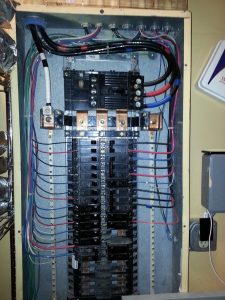
The capacity of your electrical panel
A panel upgrade is a popular service that we offer regularly to different homeowners. A panel upgrade usually becomes necessary for several reasons but one of them is to have enough power. In the past, homes were outfitted with a 60 amps panel but that continues to change with modern homes.
Modern homes demand more power depending on the electrical appliances been used and the size of the home. Hence, your panel should have a capacity of between 100-200 amps. A 100 amps service panel is ideal for a home of about 3000 square feet. This 100 amp service cannot support a central air conditioner or electric heat in some cases.
A 200 amp panel is suitable for a home above 2000 square feet with central air-conditioning and electric heat. If you are unsure about the electrical power your panel can provide, you can call an electrician to inspect the electrical panel and update you on its capacity.
Installing a new circuit
If you need to install a new appliance in the home, it is important to know how much electrical load your circuit breaker can take before tripping. Trying to add too many circuits to a single service panel is dangerous to the home.
Rather than try to shortcut the situation, you may benefit from replacing your fuse box or installing a sub panel. It is possible for the actual total amperage of the circuit breakers of the home to be almost double the indicated amperage on the breaker.
Safety with the electrical panel
Your electrical panel should be located in an isolated area of the home, away from water or direct sunlight. It should be positioned high enough for adults to reach but not children. Wires should be organized in an orderly manner around the panel. If you discover a tangled mess of wires, call a professional electrician to handle the situation.
Understanding your home’s electrical load and panel helps you to make informed decisions about your home’s electrical needs. This knowledge also comes in handy to solve simple problems before or without the arrival of an electrician. You can reach out to us to learn more about your home’s electricity.

